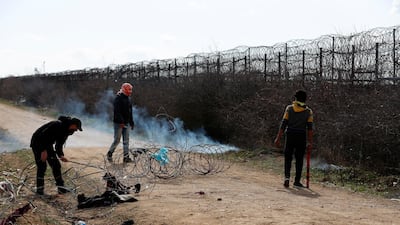The European Union is to host an extraordinary meeting of members states’ foreign ministers this week following a request by Greece after Turkey “opened the doors” for tens of thousands of migrants to try to get into the bloc.
On Monday the Greek army was deployed to its border with Turkey with authorities saying they stopped nearly 10,000 attempts to cross into the northeast of the country on Sunday and Monday morning.
Turkey is struggling to deal with a renewed surge of displaced people in the wake of the conflict in neighbouring Syria and in particular, the province of rebel-held Idlib. It has been accused of using the refugee and migrant crisis as a tool to pressure the EU.
The bloc’s foreign affairs chief Josep Borrell said on Sunday that the EU “needs to redouble efforts to address this terrible human crisis with all the means at its disposal” as he announced the meeting.
“The ongoing renewed fighting in and around Idlib represents a serious threat to international peace and security. It is causing an untold human suffering among the population, and having a grave impact on the region and beyond,” he said.
Mr Borrell said the EU was supporting Greene and Bulgaria, Turkey’s neighbours, in dealing with the crisis.
Greek Prime Minister Kyriakos Mitsotakis has himself called an emergency meeting with his foreign affairs and defence teams for Sunday evening to carve out a strategy.
The Greek government has also set up an automatic texting system for foreign mobile phones approaching the border, sending them the message: “Greece is maximising border security. Do not try to cross borders illegally."
Turkey’s President Recep Tayyip Erdogan said Turkey, home to some 3.6 million refugees, did not plan to close the borders because "the (EU) should keep its promises".
He was referring to the 2016 deal with Brussels to stop the flow of refugees in exchange for billions of euros. Turkey’s decision to open it borders has led to a renewed war of words with Greece with Athens’s accusing Ankara of becoming a “trafficker”.
The situation has similarities to events in 2015 when when more than a million migrants fled to Europe, mainly via Greece.
“We also have to continue mobilising resources to reduce the suffering of the civilian population to provide shelter, food and medicine. And EU member states also continue to do their part,” Mr Borrell said.
“Humanitarian access needs to be ensured, including to the most remote areas, where the most vulnerable people are. I underlined this in all my contacts over the past days.”


















